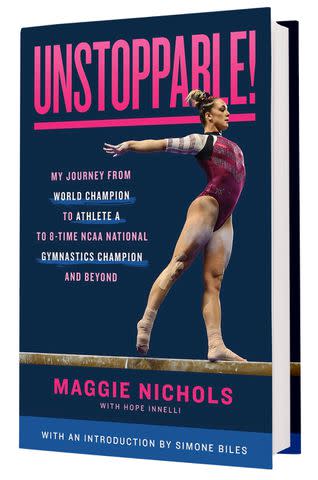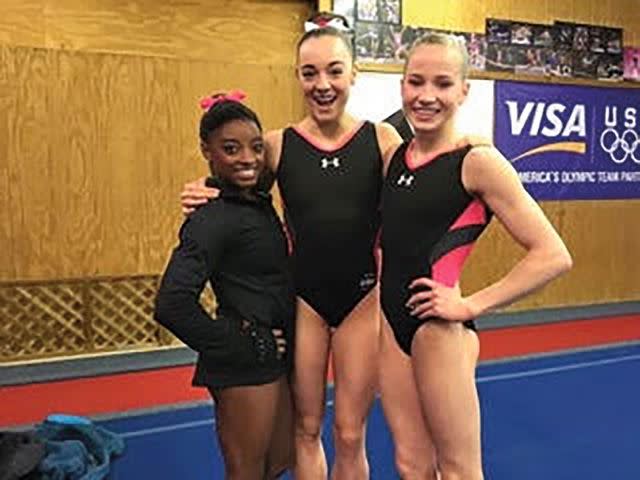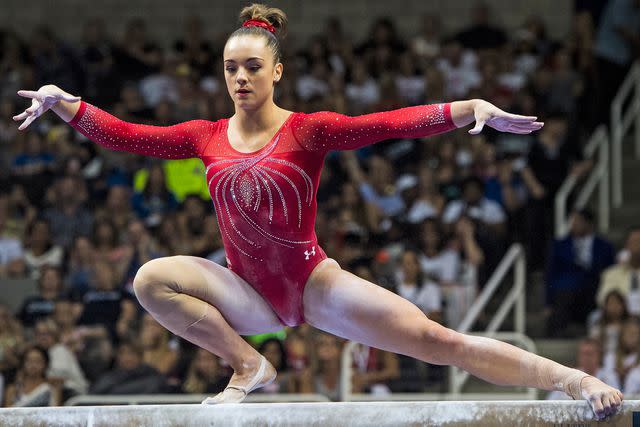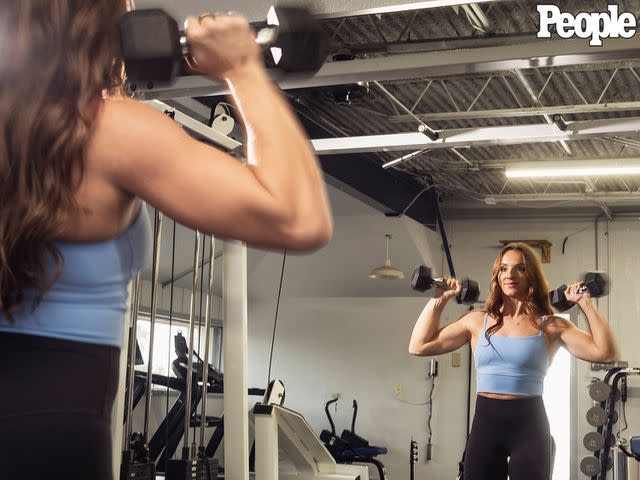Former Gymnast Maggie Nichols on the 'Pressure to Be Thin': 'Food Became a Struggle for Me' (Exclusive Excerpt)
In her new memoir, the world champion says she was so worried before weigh-ins, she'd take out her hair clips and "spit into the toilet" to get rid of more weight

Jordan Vonderhaar; Terry Schmitt/UPI/Shutterstock
Maggie Nichols photographed for PEOPLE, Jan. 10, 2024; Nichols competing for Team U.S.A. in 2016.Maggie Nichols was 14 in 2012 when she arrived at the Karolyi Ranch in Texas to train with Team U.S.A. The ranch was the home of legends Bela and Marta Karolyi, who had coached gold medal gymnasts like Mary Lou Retton and Carly Patterson. Nichols was there, alongside teammates and close friends Simone Biles and Aly Raisman, in hopes of realizing her dream of becoming an Olympian. For nearly four years, she'd travel to the ranch from her home gym near Minneapolis, Minn., for eight practices each month. Nichols was a powerful gymnast, at times scoring just behind Biles but Marta Karolyi saw her tall, muscular build as a problem, not an asset and demanded she lose weight. At the same time Nichols, like many of her other teammates, was being abused by team doctor Larry Nassar. The collective trauma led her to develop an eating disorder. Nichols, who later went on to become an NCAA champion for the University of Oklahoma, shares an exclusive excerpt from her new memoir, Unstoppable! describing her time with USA Gymnastics.

I was going through puberty at the time, and my body was changing, so it was tough. But all eyes are on you at camp, and people weren’t being very nice or subtle.
One day a coach put me in front of a mirror and asked what I saw. “I don’t know. Me?” I said, not sure what answer she was looking for. “No,” she said. “You’re puffy. You look puffy. Like a marshmallow.” I remember that vividly. I was so young, and that’s not the way I saw myself at all. But she insisted that I stay after my already long and grueling practice every day and run on the treadmill for 45 minutes. I did that for almost a year.
The coaches knew I was talented, but they were persistently trying to squeeze me into a very different shape. That’s when things took a turn. Food became a struggle for me. Now my coach was weighing me instead of me just doing it privately at home.
Since every ounce mattered, I would run into the bathroom and take out all my ponytails, remove all my hair clips, and toss my headband. I’d also spit into the toilet. I doubt it helped, but I
wanted to be rid of as much excess weight as possible.

Courtesy Maggie Nichols
Former USA gymnast Maggie Nichols (center) with teammates Simone Biles and Madison Kocian in 2015.I would be in school all day, go straight to practice, and then come home to a meager piece of fish for dinner. I was still so hungry. After working so hard in the gym, barely eating and burning so many calories, I was spent. I wasn’t having enough food, and what food I did eat was not what my body needed. Protein helps repair muscle that gets broken down during exercise, but it is not a very good source of energy, and my body badly needed energy. It had no fuel!
Some nights I couldn’t help myself; I would sneak downstairs and grab a small bowl of Special K—a protein cereal. That was what I considered cheating.

Donald Miralle /Sports Illustrated via Getty
Maggie Nichols competing at the US Olympic trials in 2016.Related: Shawn Johnson Opens Up About Her Eating Disorder: 'I Would Eat 700 Calories A Day'
The scale and I weren’t friends for a very long time. The mirror and I weren’t friends either. Even when my body started looking like what other people wanted it to look like, I thought it was looking worse. The idea that I needed to look thinner was always in my head. Whatever progress I made was never good enough. I wanted to be so perfect for the national team and my coach. I wanted to make the World and the Olympic teams.
I was never diagnosed with an eating disorder or body dysmorphia, but I definitely think I had both for a very long time. At first, it felt imposed on me by others, but then my own drive to be perfect
made it worse.
I’m way better now, but the whole experience has left scars. When I look at pictures of me taken during the World Championships and I see what a twig I was, I sometimes think, "I kind of like how I look there." I wish I still had those abs. I wish I had a six-pack like I used to. But I have learned to fuel myself the way I need to, and I use the strong will I was born with and developed further in gymnastics to help overcome those kinds of thoughts.
From Unstoppable! ©2024 by Maggie Nichols. Reprinted with permission from Roaring Brook Press. All Rights Reserved.

Jordan Vonderhaar
Maggie Nichols photographed for PEOPLE at home in South Padre, Texas, Jan. 10, 2024.For more People news, make sure to sign up for our newsletter!
Read the original article on People.

 Yahoo Lifestyle
Yahoo Lifestyle 
